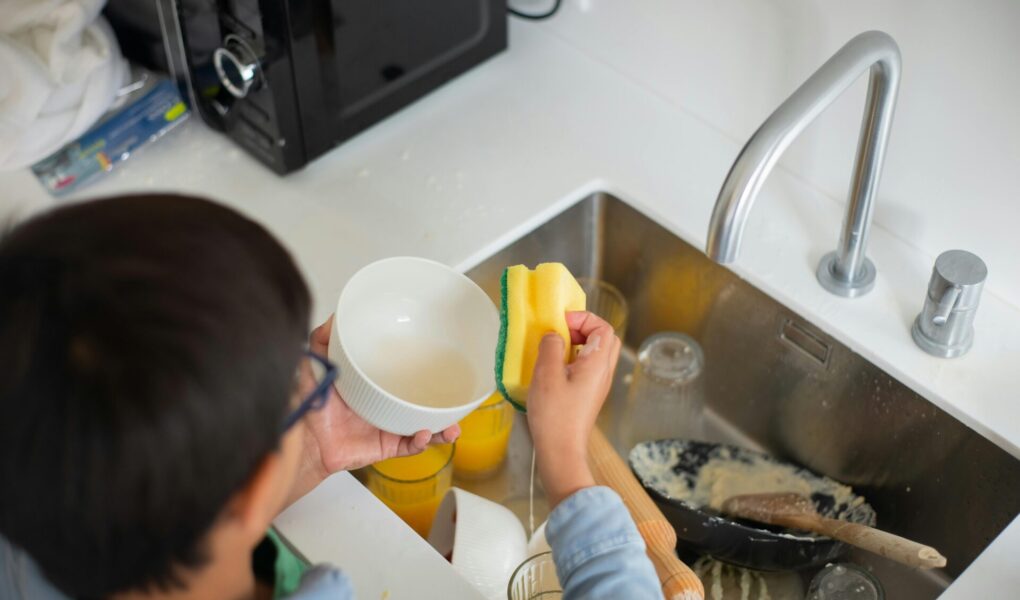When it comes to chores for kids, it may sometimes be tricky to decide when to start or what chores to assign. Should the responsibility of chores be given when the child is older or the sooner you start, the better?
The truth is that there are many benefits in assigning chores to your children.
The American Academy Of Child & Adolescent Psychiatry says “Children who do chores may exhibit higher self-esteem, be more responsible, and be better equipped to deal with frustration, adversity, and delayed gratification. These skills can lead to greater success in school, work, and relationships.”
When children are given chores at home, it teaches them responsibility, time management skills, and prepares them to be capable adults.
This brings the question: When is the right time to assign chores to children?
The answer: From the very beginning. Since they are toddlers, you can give them easy chores that they can easily handle. As your children get older, you can begin to assign more complex chores for them to complete.
Some things to consider before assigning chores
The main thing you must keep in mind is that the chores need to be age appropriate. We wouldn’t send a 2-year-old to take the trash bin to the curb, right?
You must also entrust them with responsibilities that they can do without a high risk of getting hurt. You know your child best and are aware of their abilities. Keep that in mind before assigning them a house chore.
When they complete their household obligations (regardless of how much they may complain about doing it), children feel a sense of accomplishment. Therefore, reinforcing their view of themselves as someone capable and responsible. If their assignments are too hard (whether it is because they are too small or struggle with a particular skill) they are just going to look down on themselves and might begin to see themselves as someone who can never do anything right.
Are chores important?

Absolutely!
As we discussed before, chores teach kids responsibility, life skills, it helps build their sense of self-worth and capability, among many other things.
However, chores also serve another very important purpose: Self-sufficiency.
When a child learns how to pick up after themselves, make their beds, throw out the trash, clean the dishes, etc.; they learn how to take care of themselves. Little by little, you begin to shape a self-sufficient adult that will be able to take the reins of their own life.
Remember, our goal as parents is to raise a well-rounded functioning adult.
Where to start
1. Determine age-appropriate chores
Consider how old your child is and what chores you think they would be able to manage. Avoid assigning them tasks that would set them up for failure, or that they are too young to effectively manage.
Also, keep in mind your child’s abilities and skills. Not every child is the same and some kids may struggle in some areas more than others.
2. Reinforce!
Anyone who is raising or has raised children will tell you how much and how often you need to remind your child to do their chores. As they get older, they might take care of their assigned responsibilities without you having to tell them, but even then, you might still have to offer regular reminders for them to get it done.
Make sure they have the tools they need to complete the task and show them the proper way to do things.
Always be consistent and don’t take over their chores because you “can do it better and faster”. Let them do it on their own. With time, they will become more proficient and faster.
If your child seems confused and is not sure how to do something, offer guidance and allow them to finish their task.
Resist the urge to do it yourself and continue to reinforce.
3. Don’t forget to encourage them

A little encouragement goes a long way. Tell your child that they did a good job and that you are proud of them for always doing their tasks.
You do not have to over-praise, exaggerate their skills, or over-inflate their ego. That is not necessary. All you have to do is tell them that they have done a good job and how you have observed their skills improving. Let them know you have taken notice of the quality of their work while doing their chores and that you feel proud.
This will have very positive effects and will make your child feel accomplished. They will see that their hard work is being noticed.
4. Reward
Words of affirmation are often more than enough as a reward. However, if your circumstances allow it, you can reward them by going to an ice cream parlor or getting them something they really want.
You can tell them that you have noticed how well they have been doing with their chores and that you want to reward their hard work. This serves as an extra boost and encouragement.
Some parents also choose to make it part of their children’s allowance. That way, the child can learn that hard work pays off. It can also teach them the value of money and how good work yields good results.
Something to keep an eye on: Be careful not to send the message that they are getting “paid” for their chores. Children may begin to feel entitled to compensation for simply keeping their room clean. They need to understand that this is their responsibility regardless of a reward.
5. Consider a chore board
Depending on your child’s age and circumstances, you might want to consider implementing a chore board or chore wheel.
That way, your child can reference it and see what they may need to complete for the day.
This way there is no confusion on who needs to do which chore, and things can get done more efficiently.
6. Make it a part of the routine
If you make it a part of their daily routine, it will be much easier for your child to complete their daily tasks.
Here are a few examples:
- When they come home, they need to place their bookbag in the designated space (don’t do it for them)
- They have to put away their shoes when they take them off, not just leave them anywhere
- When they finish eating, they can place the dishes in the sink or dishwasher
- Put their dirty laundry in their hamper
The chore doesn’t need to be a big thing like mopping the floor. They begin to learn organization and responsibility from these seemingly small things.
7. Don’t forget to say Thank You

You know that feeling when you have cooked a meal and your family says, “Thank you, it was delicious”. How does it make us feel? Happy, proud, and just gives us that extra boost to keep going? Well, our children experience the same feeling when you say thank you.
It doesn’t cost much, and it certainly doesn’t take a lot of time to say it. But it will have a huge impact on your child to hear you thank them for a job well done.
Possible chores by age
Toddler
- Put their toys away
- Help parents while cleaning (they can carry the glass cleaner, help dust, or any other task that they can offer to assist with)
- Put their dirty clothes in the laundry basket
- Helping with pets
- Put books back into the bookshelf
4-6 Years old
- Help load the washer and dryer
- Put away their laundry
- Dust the house
- Help with vacuuming
- Help feed the pets
- Make their bed
- Sort and put away their toys
- Help set the table
- Help bringing in the groceries
7-9 Years old
- Vacuum the house
- Load washer and dryer
- Load the dishwasher
- Dust the house
- Put away laundry
- Feed the pets and take over some of the caretaking
- Make their bed
- Clean their room
- Set the table
- Bring in the groceries
- Take out the trash and replace trash bags
10 years old and up
Note: Some of these chores are up to your discretion and for older children. You also need to consider the area in which you live. In some areas, it is safe for a child to walk home on their own by the time they are 10 years old, but not so much in other areas.
- Vacuum the house
- Load washer and dryer
- Load and unload the dishwasher
- Dust the house
- Folding and putting away laundry
- Feed the pets and share the responsibility of the caretaking, such as walking the dog
- Make their bed
- Clean their room
- Clean the toilet and sinks
- Set the table
- Bring in the groceries and put them away
- Take out the trash and replace trash bags
- Walk younger siblings from school
- Watch younger siblings as you run errands (they have to be older, and you have to determine if they are responsible enough to be entrusted with this responsibility)
- Clean the dishes
- Some cooking
- Cleaning the bathroom
- Sweeping and mopping
- As they get older, you may begin to transition them into being in charge of doing their laundry on their own
In conclusion

No kid is ever excited to do chores, if anything, you will always have to remind them to get things done. Sometimes, they might even grace you with an over-pour of attitude and sass as they go throw out the trash or do the dishes. This may happen more often than not.
But there will be those rare days when you will only have to tell them once and they will take care of their chores with no animosity. Relish those moments because they do not come too often, lol.
All jokes aside, always be patient and consistent with your child. They may not understand why they have to do these things and might even feel as if you are punishing them. But when they grow up, they will be grateful because they will feel prepared to go out into the world confidently. Knowing that they have the tools they need to be self-sufficient adults.




